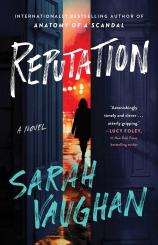Reading Group Guide
Discussion Questions
Reputation

1. Why do you think Sarah Vaughan chose to open with the scene of Mike’s murder? How is it effective in setting the novel’s tone and introducing us to Emma? What do you learn about Emma before you even know her name?
2. There are many pieces of ironic foreshadowing in the early chapters of the novel, including Emma’s t-shirt that reads “Well Behaved Women Seldom Make History.” Find other examples of foreshadowing and consider how they help set the mood of the novel.
3. There is much commentary in the novel on how women are judged by society and the gendered rules they must follow to maintain their good reputations. Emma comments that in her photoshoot, she thought she looked serious, but “I just looked as if I took myself seriously (a cardinal sin for a woman)” (p. 11). In what ways is taking oneself seriously as a woman shown to be a tricky thing to do in our world?
4. Compare and contrast the three main women in the novel, Emma, Flora and Caroline. How are their motivations similar? How do they differ? Was there a character with whom you empathized more?
5. Before the murder, Emma has a good reputation, both in her public and private lives. Find examples of where and how her good reputation protects her. How do characters describe Emma? Would you describe her in the same way?
6. Emma’s motivation for going into politics was her father, who used to ask her “What are you going to do about it?” when faced with injustice. She explains, “[It] was the rallying cry that had inspired me to study politics and history, the first in my family to go to university” (29). How does knowing this detail about Emma influence your understanding of her subsequent choices? Do you think this rallying cry motivates other characters in the novel?
7. What details does Sarah Vaughan include to create the tense, claustrophobic atmosphere of Emma’s life in the days leading up to Mike’s murder? In what ways are they paralleled in the subsequent trial?
8. Although Flora more obviously deals with mean-girl bullying, adult women in the novel experience or make bullying remarks as well. How does the adult bullying resemble the teenage kind, and how does it differ? Do you think the stakes are any higher or lower?
9. Emma makes the decision to answer the detectives’ questions in her initial interview, despite her lawyer telling her not to comment. Emma explains her need to cooperate is “that old desire to be a good girl, to always answer questions” (158). Where else do you see Emma trying to please in a similar manner? Do Flora and Caroline do the same?
10. In addition to the epigraphs, Sarah Vaughan references other books when Emma looks at her friend Claire’s boyfriend’s books on page 180. His collection includes “Rawls’s A THEORY OF JUSTICE; Locke’s AN ESSAY CONCERNING HUMAN UNDERSTANDING; Bagehot’s THE ENGLISH CONSTITUTION; set texts by Descartes, Berkeley, and Hume...There are a few thrillers” and “THE DUCHESS OF MALFI.” Research these texts and see how they relate to Emma’s current situation. How do they emphasize the themes in REPUTATION?
11. How responsible do you think Flora is for what happens at Emma’s home on December 8th? Flora blames herself, thinking, “If it wasn’t for Flora, then Mike would be alive, and her mum wouldn’t be...facing up to the fact that in a week’s time she might be in prison” (232). How did you feel about this assessment before the twist, and did you reconsider Flora’s feelings of guilt afterward?
12. After the verdict is reached, Emma answers a few questions from the press. When asked what she feels when she thinks about the night of December 8th, Emma responds that she feels “Shame and regret.... There’s not one day when I don’t regret what happened” (259). Do you think Emma regrets what she did or regrets getting caught and having her reputation tarnished?
13. Were you shocked by the revelation that the whole family was somehow involved in the acts of December 8th and its cover-up? What elements surprised you the most? Would you have gone to the lengths Emma, Caroline and David did to protect Flora?
14. Once you learn the second twist at the end --- what part of Emma’s past she is so desperate to keep secret --- go back and read a few of the key scenes. How do you understand them differently with your knowledge of the last few chapters of the novel? What techniques does Sarah Vaughan employ in order to give double meaning to many of Emma, Flora and Caroline’s thoughts and statements?
Reputation
- Publication Date: July 25, 2023
- Genres: Fiction, Psychological Suspense, Psychological Thriller, Suspense, Thriller
- Paperback: 352 pages
- Publisher: Atria/Emily Bestler Books
- ISBN-10: 1668000075
- ISBN-13: 9781668000076







